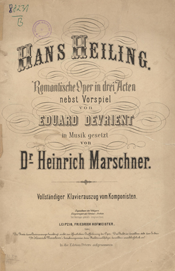
01 Dec 2006
MARSCHNER: Hans Heiling
Hans Heiling, romantic opera in three acts and prologue.
Music composed by Heinrich Marschner (1795-1861). Libretto by Philipp Eduard Devrient, based on Bohemian legends.
Mozart and Salieri, an opera in one act consisting of two scenes.
Nicolai Rimsky-Korsakov (1844-1908), composer. Libretto derived from Alexander Puskhin's play of the same name.
First performance: 7 December 1898 in Moscow.
Ariadne auf Naxos, Oper with a prologue and one act. Music composed by Richard Strauss. Libretto by Hugo von Hofmannsthal.
La Vestale, a tragédie lyrique in three acts.
Boris Godunov, an opera in four acts with prologue
Modest Mussorgsky, composer. Libretto by the composer, based on Alexander Pushkin's drama Boris Godunov and Nikolai Karamazin's History of the Russian Empire
First performance: 8 February 1874 at the Mariinsky Theatre, St. Petersburg
Il Trovatore, dramma in four parts.
Only a few months following the premiere of Der Rosenkavalier, Hugo von Hofmannsthal proposed a new opera to Richard Strauss based on Molière’s comedy-ballet, Le Bourgeois gentilhomme (in German, Der Bürger als Edelmann).
Die Entführung aus dem Serail, Singspiel in 3 Acts.
Music composed by Wolfgang Amadeus Mozart (1756–1791). Libretto by Johann Gottlieb Stephanie the Younger, based on an earlier libretto by
Christoph Friedrich Bretzner.
Die Entführung aus dem Serail, Singspiel in 3 Acts.
Music composed by Wolfgang Amadeus Mozart (1756–1791). Libretto by Johann Gottlieb Stephanie the Younger, based on an earlier libretto by
Christoph Friedrich Bretzner.
Arabella: Lyrische Komödie in three acts
Die Entführung aus dem Serail, Singspiel in 3 Acts.
Music composed by Wolfgang Amadeus Mozart (1756–1791). Libretto by Johann Gottlieb Stephanie the Younger, based on an earlier libretto by
Christoph Friedrich Bretzner.
La Gioconda, dramma lirico in four acts.
Music composed by Amilcare Ponchielli (1834–1886). Libretto by Arrigo Boito (under the pseudonym Tobia Gorrio), based upon Victor Hugo's Angelo, Tyrant of Padua (1835).
Don Carlo, an opera in four acts. Music composed by Giuseppe Verdi (1813–1901). Libretto by Joseph Méry and Camille Du Locle after Friedrich von Schiller’s dramatic poem Don Carlos, Infant von Spanien. Revised version in four acts (French text revised by Du Locle, Italian translation by Achille de Lauzières and Angelo Zanardini).
Un ballo in maschera, a melodramma in three acts.
Music composed by Giuseppe Verdi. Libretto by Antonio Somma, based upon the work of Eugène Scribe Gustave III ou Le bal masqué (1833)
Medea: Melodramma tragico in three acts.
Die Tote Stadt, an opera in three acts.
Music composed by Erich Wolfgang Korngold (1897-1957). Libretto by Paul Schott (Julius and E. W. Korngold) after the novel Bruges la morte by Georges Rodenbach.
Some Details concerning the Revolution inaugurated by Rossini
Manon Lescaut, dramma lirico in quattro atti
Elektra: Tragedy in one act.
Lyric Opera of Chicago has announced both schedules and cast-lists for is Spring 2020 performances of Richard Wagner’s Ring Cycle. Given the series of individual productions already staged by the company since Fall 2016, that pave the way for the complete cycle, Lyric Opera of Chicago’s complete production should affirm the artistic might of the great composer.
“Diacono himself does not know what musical talent he possesses” – Mascagni

Hans Heiling, romantic opera in three acts and prologue.
Music composed by Heinrich Marschner (1795-1861). Libretto by Philipp Eduard Devrient, based on Bohemian legends.
Streaming Audio
First Performance: 24 May 1833, Königliches Opernhaus, Berlin.
| Principal Characters: | |
| Queen of the Erdgeister | Soprano |
| Hans Heiling, her son | Baritone |
| Anna, his bride | Soprano |
| Gertrud, her mother | Alto |
| Konrad, a hunter and Anna’s sweetheart | Tenor |
| Stephan, a blacksmith | Bass |
| Niklas, a tailor | Tenor |
Synopsis:
Prologue
Hans Heiling has fallen in love with a girl he found during a trek on the earth. He wants to leave the empire of the Erdgeister forever, despite all warnings of his mother, the Queen.
Act I
Hans Heiling ascends to the earth from his home in the underworld. He brings a magic book and jewelry for his would-be bride. With these in hand, Heiling approaches Anna. But Anna is terrified by the book. Heiling burns the book on Anna’s request. They renew their vows of fidelity. They then go to the village festival. There are many people at the tavern drinking, dancing and singing. Konrad joins them, who has loved Anna for a long time. Konrad asks Anna to dance. Hans Heiling objects angrily; but, Anna ignores him. Heiling suspects that his bride doesn't love him.
Act II
Anna leaves to go home through the forest and becomes lost. She is concerned because she loves Konrad, but she is Heiling’s bride. Suddenly, the Queen appears and beseeches the girl to release her son, who is not a human being but a prince of the underworld. Anna faints. Konrad finds the girl and takes her home.
Once again, Hans Heiling approaches Anna to win her over. However, the girl returns the jewelry. In a rage, he stabs Konrad. Heiling then runs away, laughing scornfully.
Act III
Hans Heiling is tired and returns to the Erdgeistern. He finds out that Konrad is not dead and that Anna will marry him the next day. Heiling returns to the earth to take revenge on the faithless.
Konrad and Anna are wedded in the forest chapel. Following an old custom, they must now find each other while blindfolded. Hans Heiling steps in and seizes Anna’s hand, who pleads for mercy. Konrad rushes to help his wife; but, his knife shatters as he strikes Heiling. Heiling summons the Erdgeister to destroy all the people. The Queen appears and persuades her son to reconcile. Hans Heiling returns to the underworld.